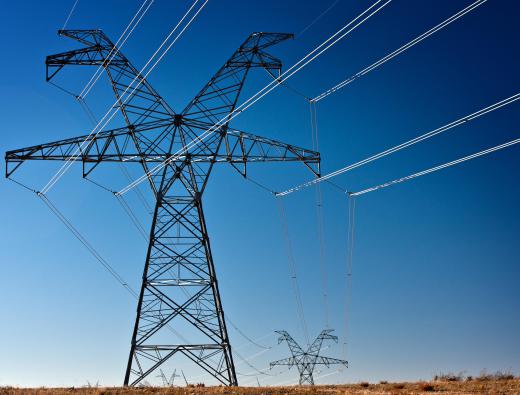A line filter is an electronic device that is part of many appliances and machines powered by electricity. Its purpose is to reduce, remove or divert electromagnetic interference (EMI) or radio-frequency interference (RFI). Any electrical device can generate an electromagnetic field. Many devices can pick up these fields, creating interference with the radio frequencies used by communications equipment. A line filter will eliminate this interference, allowing a purer signal to be transmitted.
Communications devices, such as televisions, telephones, and radios, operate by converting sound and visual information into electronic signals. These signals are then transmitted to receiving devices, which convert them back into understandable communications. While in electronic form, these signals are part of a wider field of energy known as the electromagnetic spectrum. All electronic devices, including power lines, also emit electromagnetic fields as a consequence of their normal functioning. A line filter must be used to separate out these incidental electromagnetic signals.

When the first household communications and entertainment devices were introduced, there were generally few other electronic appliances in the surrounding environment. In modern times, any given location will have multiple electrical devices, including computers, kitchen appliances, and power tools, among others. Any of these machines can create electromagnetic interference. Most nations have regulations limiting the amount of interference a manufactured device can create. An examination of the device will often reveal a notice describing the applicable regulations.

Even a device that is not connected directly to a power line, such as a cell phone, is still attached to an internal battery. The signal that reaches the phone, meanwhile, is often transmitted by telephone lines before reaching a transmitter tower. Any of these power sources or lines will generate electromagnetic fields that can create interference. The most common kind of line filter is used to prevent interference from the device’s own power connections. Another kind prevents interference from external power lines or other devices that may be nearby.
A line filter is usually a kind of electronic component called a capacitor. A capacitor is a passive electronic circuit, built into the device, consisting of conductors separated by an insulator. A line filter capacitor is designed to allow the desirable signal to pass unimpeded while recognizing the interfering signal and stopping it. It often diverts this interfering signal into the device’s "ground," where it dissipates harmlessly. When a line filter is not functioning or not present, the interference can be detected as visual or auditory static that, if severe enough, can totally disrupt the communications signal.
